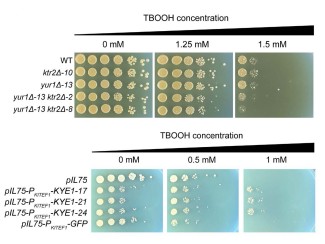Even Amy Enright Steinberger's advisors consider her a mentor

At the Great Lakes Bioenergy Research Center, mentoring programs provide young scientists the support they need to succeed by connecting them with more experienced researchers.
Amy Enright Steinberger, a graduate student in the Peters’ Lab at the University of Wisconsin–Madison, received the 2025 GLBRC Mentoring Award, given in recognition of members who strive to promote the success and development of those around them.
Undergraduates, fellow grad students, postdoctoral researchers – and even her own advisor – credit Steinberger for her support in and out of the lab, which applies bacterial genetics to address critical issues in the bioeconomy and antimicrobial resistance.
Current and former lab mates noted her enthusiasm and patience in guiding them through research as well as support outside of the lab, helping students pick classes and ensuring that they feel prepared for graduate school.
Chandler Holschbach said Steinberger has been a “fantastic mentor” during his rotation through the lab last year and now as a research assistant.
“She made sure to thoroughly explain everything that we were doing at the bench, as well as the theory behind it all,” Holschbach said. “No matter what question I asked, or when it was asked, she was always willing to help me understand what was going on. She put my priorities above her own for the entire rotation."
Steinberger’s own work aims to remove one of the obstacles to economically viable biofuels: decreased yield of ethanol due to microbial stress.
She employs CRISPR-based functional genomics to understand stress responses in Zymomonas mobilis, a prolific biofuel-fermenting bacterium. The goal is to characterize key genes and genetic interactions in order to engineer robust strains with increased tolerance to toxic compounds in biomass.
Santosh Kumar, now an assistant professor of biology at McMurry University, said Steinberger guided him through CRISPRi experiments and data analysis when he worked as a scientist in the Peters lab.
“Her ability to describe complex processes and provide feedback was a lifesaver in learning new experimental systems and sharpening my expertise,” said current postdoc Nachiketa Bairagi.
Adam Ghazzali, an undergraduate student at Xavier University of Louisiana, said Steinberger made his summer research internship “enjoyable and inspiring.”
“Whenever I needed assistance—whether it was with coding, using Excel, or understanding lab materials—she took the time to break things down in a way that made sense,” Ghazzali said. “Instead of just giving me the answers, she guided me to resources that helped me learn and become more independent.”

Peters himself considers his student a mentor, noting her leadership and commitment to improving lab organization and communication and crediting her with helping put him on track for tenure.
“Amy told me that she was a leader after about months of being in the lab, which is unusual,” Peters wrote in his nomination. “It turns out I had a lot to learn from Amy!”
Peters asked Enright Steinberger to work with two other students on a comprehensive review article.
“She responded by organizing meetings, setting deadlines, and assigning specific tasks to herself, the other students and . . . me,” Peters said. “I thought, Hmm . . . maybe I should do this stuff too.”
Steinberger said mentorship goes both ways: Peters has fostered her development as a scientist and encouraged her growth as a leader.
In addition to Peters, Steinberger credits Bonnie Bratina, a professor who helped her discover a love for microbiology as an undergraduate at UW–La Crosse, and Kim Haupt, a grad student who mentored her when she was a research intern in Judith Kimble’s lab at UW–Madison.
A standout collegiate gymnast, Steinberger also tries to emulate her former coaches.
“They were really great about building a team where everybody knew they were contributing in a meaningful way,” she said.
Steinberger said mentorship isn’t just about building confidence in science. It’s about connecting with each other as people and growing together.
“Mentorship is part of any job,” she said. “Mentorship and teamwork are just going to show up no matter where you go next. Even if it’s in informal ways, there are always opportunities to interact with people and continue to grow with each other.”





